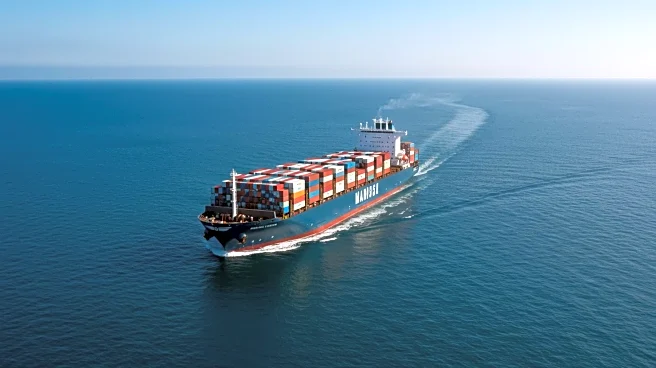What's Happening?
The maritime industry is facing significant challenges as it seeks to achieve a sustainable blue economy. Geopolitical instability and an unpredictable policy environment are disrupting operations and reshaping global trade routes. Shipowners and operators are under pressure to meet regulatory demands aimed at reducing carbon emissions. The upcoming IMO Net Zero Framework is expected to introduce mandatory marine fuel standards and emissions pricing, adding to the complexity of compliance. The industry is encouraged to adopt green financing models and establish green corridors to support zero-emission trade.
Why It's Important?
The maritime industry's transition to a sustainable blue economy is crucial for reducing global carbon emissions and achieving environmental goals. The regulatory changes present both challenges and opportunities for shipowners, who must navigate compliance costs and adapt to new technologies. The industry's ability to meet the IMO's net-zero targets by 2050 will depend on systemic changes in financing, fueling, and operations. Successful adaptation could enhance the industry's reputation and attract customers committed to sustainability.
What's Next?
The introduction of the IMO Net Zero Framework will likely increase compliance costs for shipowners, prompting a reevaluation of strategies and investments in clean technologies. The industry may see a shift towards green financing and the development of green corridors to facilitate zero-emission trade. Classification societies like Bureau Veritas are expected to play a key role in supporting the transition by providing expertise and facilitating collaboration across the maritime value chain.
Beyond the Headlines
The push for a sustainable blue economy highlights the need to address historic inefficiencies in maritime operations, such as the 'sail fast, then wait' practice. Initiatives like the Blue Visby Solution aim to optimize arrival times and reduce emissions, demonstrating the potential for innovative solutions to drive change. The industry's transition also raises ethical considerations regarding the equitable distribution of resources and the impact on seafarers' safety and livelihoods.









